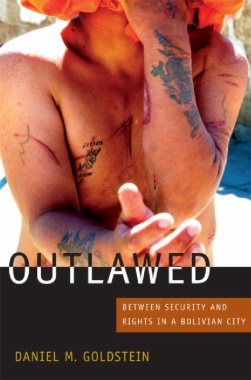In Outlawed, Daniel M. Goldstein reveals how indigenous residents of marginal neighborhoods in Cochabamba, Bolivia, struggle to balance security with rights. Feeling abandoned to the crime and violence that grip their communities, they sometimes turn to vigilante practices, including lynching, to apprehend and punish suspected criminals. Goldstein describes those in this precarious position as "outlawed": not protected from crime by the law but forced to comply with legal measures in other areas of their lives, their solutions to protection criminalized while their needs for security are ignored. He chronicles the complications of the government's attempts to provide greater rights to indigenous peoples, including a new constitution that recognizes "community justice." He also examines how state definitions of indigeneity ignore the existence of marginal neighborhoods, continuing long-standing exclusionary practices. The insecurity felt by the impoverished residents of Cochabamba—and, more broadly, by the urban poor throughout Bolivia and Latin America—remains. Outlawed illuminates the complex interconnections between differing definitions of security and human rights at the local, national, and global levels.
- Contents
- Acknowledgments
- Chapter 1. Security, Rights, and the Law in Evo’s Bolivia
- Chapter 2. Getting Engaged: Reflections on an Activist Anthropology
- Chapter 3. The Phantom State: Law and Ordering on the Urban Margins
- Chapter 4. Exorcising Ghosts: Managing Insecurity in Uspha Uspha
- Chapter 5. Community Justice and the Creative Imagination
- Chapter 6. Inhuman Rights? : Violence at the Nexus of Rights and Security
- Chapter 7. An Uncertain Anthropology
- Notes
- References
- Index

